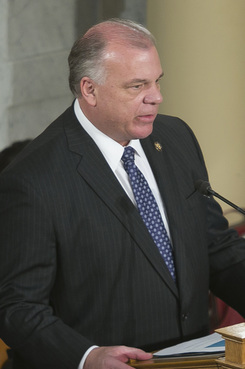What Extinguished the Marijuana Bill in New Jersey? 'A Lot'
Months after legislative efforts to legalize marijuana in New Jersey failed, questions still linger as to what exactly went wrong, and what's likely to happen next.
July 01, 2019 at 04:02 PM
14 minute read
 Credit: Yarygin/Shutterstock.com
Credit: Yarygin/Shutterstock.com
As the New Jersey Legislature closed shop for summer recess, thoughts of what could have been on the marijuana legalization effort that stalled flitted among legislators and lawyers.
Why the weed bill failed this year was baffling. Many considered it a slam dunk in a state with a Democratic-controlled Legislature and a Democratic governor who not only supported the measure but made legalizing adult use of marijuana a centerpiece of his gubernatorial campaign in 2017.
In hindsight, some believe that the closeness of the vote tally in the Senate—at least 18 or 19 legislators were publicly on board of the needed 21 votes for passage—means it was only a matter of “when” and not “if” adult use of marijuana would become legal.
However, according to several key lawmakers, it now remains the expectation that the issue will be resolved in a 2020 ballot question—the same route that gambling in Atlantic City, and more recently, sports betting at casinos and racetracks, took.
“The only way is going to be the referendum,” Senate President Stephen Sweeney told the Law Journal in late June, the day the Legislature approved a $38.8 billion state budget, 10 days ahead of the July 1 deadline to avert a government shutdown.
Marty Judge, co-chairman of the cannabis group at Flaster Greenberg in Cherry Hill, summarized the weed bill's fade to black in the Legislature.
 Marty Judge/courtesy photo
Marty Judge/courtesy photo“It was a combination of political things and misplaced chess pieces by both supporters and opponents,” he said. “Gov. Murphy ran on a ticket that he supported the legalization of recreational use cannabis. He was overwhelmingly elected and he viewed it as a mandate from the people.”
Added Judge: “There's bipartisan support in certain parts of the state, and there is partisan opposition as well. A lot of these policies are not necessarily going to get popular support from all people, or those from the middle that one would surmise from the election translating over to the area of cannabis. There are number of unanswered questions … and I'm not sure the experience of other states has been around long enough to learn from.”
But some, such as Michael McQueeny, co-chairman of Genova Burns' cannabis practice group in Newark, say the expansion of medical marijuana use in New Jersey with additional dispensaries coming online in the coming months will only keep the momentum alive for recreational use.
McQueeny said the structure in place for medical marijuana is essentially the same regulatory framework for recreational marijuana use.
“Virtually, there is no loss of momentum with medical expansion of marijuana, with the ultimate goal of adult use,” McQueeny said. “We will improve upon the concepts of adult use.”
 Sen. Steve Sweeney. Photo: Carmen Natale/ALM
Sen. Steve Sweeney. Photo: Carmen Natale/ALMThe 300-plus page New Jersey Cannabis Regulatory and Expungement Modernization Act outlined how to organize and regulate a new cannabis industry, who would benefit from it and by how much, and had set social reform as a key target.
But after sailing through judiciary committees of both chambers after its official rollout in mid-March, the bill failed to garner the support needed to remain on the voting board lists of each house just a week later. On May 15, it was declared “dead” for the remainder of this legislative calendar year by Sweeney.
“The votes aren't there,” Sweeney said at the time, alluding to his 40-member Senate chamber.
“That's on me. This is a defeat.”
But what wasn't on him, he said, was the governor's role in the bill's collapse. Sweeney blamed in part Murphy for expanding medical marijuana at the same time, which he said took the wind out of the recreational weed bill.
“Once the governor announced the expansion of medical marijuana against the advice of the Legislature, it was over,” Sweeney said at a Statehouse news conference in May. “That took the energy out of the recreational piece. There was no longer an urgency in getting it passed with the expansion of medical. It took the pressure off.”
Observers say the bill gradually fell apart for various reasons: intraparty squabbles, regional differences, and a side plot over tax incentives, with competing investigations and legal teams pitting Murphy against South Jersey politico George Norcross, who is closely aligned with Sweeney.
When it came to derailing legalization legislation, “there was a lot,” Senate Judiciary Committee chairman Nicholas Scutari, D-Middlesex, recently said. “There were a number of different reasons, to the point that there's many people who just don't believe in it to begin with. There are others that didn't believe in some of the things we were trying to do with it—the oversight, amount of licenses, the taxation rate.
“It was an extremely thorough, well-crafted bill,” Scutari said during a break in one of the Senate's final voting sessions before summer break. “Tons of hours [were] spent on it among leaders, myself, sponsors, advocates and groups. The bill was well done. It just did not have enough. We were close, but we just don't have enough votes, and I don't see that changing right now.”
So will the pot bill make a comeback?
 New Jersey state Sen. Nicholas Scutari/courtesy photo
New Jersey state Sen. Nicholas Scutari/courtesy photo“Highly unlikely at this point, legislatively,” Scutari said. “More than likely it's going to have to be … voters in a referendum. I prefer to do it legislatively because that's the better way to do it. But it doesn't seem like we have support in the Legislature to get it done.”
Sen. Declan Scanlon, a Republican representing Monmouth County, agreed.
“I think the effort to legalize legislatively is dead,” said Scanlon, a member of the Senate Law and Public Safety and Budget committees who has been involved in efforts toward criminal justice reform. “I think it will go to the voters. I am OK with that.
“There are fair concerns on both sides of the issue,” he said. “One of the key things to get right if we're going to legalize recreational marijuana is that the revenue needs to be dedicated very specifically to things that will reduce our structural deficit, and enhance our ability to dissuade driving under the influence and to punish those that do.
“Critical things need to happen, and we will cross those bridges when, and if, we come to them,” added Scanlon. “But I don't think we will get to them until the fall of 2020, when the voters speak, if they approve.”
The Opposition
Groups opposed to legalizing recreational marijuana use, such as NJ-RAMP (Responsible Approaches to Marijuana Policy) and SAM (Smart Approach to Marijuana) Action, did their part to torpedo the bill.
“The anti-marijuana folks certainly put a convincing campaign that really mobilized the opposition, and it was just enough to get that seed of doubt to sway if not public opinion, legislative opinion, toward voting against it,” McQueeny said.
“There was momentum going into the final week of a potential vote. Unfortunately for New Jersey, we are not on the West Coast. There is not enough of a critical mass to have seen the industry in operation in states, like Colorado, California and Washington, to understand that the marijuana industry is not the boogeyman that the opposition may make it out to be.
“A lot of what we've dealt with with the adult use bill is more about misperception than anything else. The majority of adults are for adult use, and a lot of the legislators are for it,” McQueeny said.
Opposition groups, however, have contended that legalization would have real, and significant, negative consequences.
Dr. Kevin Sabet, president of NJ-RAMP and SAM and a former drug policy adviser to President Barack Obama, seized on the failure of legalization legislation, not just in New Jersey, but also bills in Vermont and New Hampshire, as wins for the public.
“Consecutive years of victories for public health and safety in these states is revealing that the movement for legalization is losing steam,” Sabet said in a statement. “Last week was a resounding, nationwide victory for the minority communities who are relentlessly targeted by Big Marijuana and its Big Tobacco funders, as well as families, schools, and those using roads or public transportation.”
In New Jersey, Sabet said, NJ RAMP began its work to defeat the effort when Murphy promised marijuana would be legalized within 100 days of his taking office in January 2018.
“The people of New Jersey thank Sen. Sweeney for shutting down this reckless bill for the rest of 2019,” said NJ-RAMP Executive Director Stephen Reid on May 15, when the marijuana bill was declared dead. “We especially thank Sen. Ron Rice, head of the Black Legislative Caucus, for his relentless leadership and championing the cause of those most vulnerable. This is a banner day for New Jersey.”
The complex and turbulent political environment simply didn't lend itself to dealmaking, said Dale Florio of Princeton Public Affairs Group Inc., the state's top-grossing lobbying firm last year.
“Creating an industry from the ground up is a big deal,” Florio said. “The fact [that] the industry is marijuana is even a bigger deal. It did not pass because everyone failed to see that this is a 'personal choice' issue. Legislators have deep-seated views on marijuana that are less susceptible to deals. How you vote on this issue tells people who you are. … This is a defining issue for people personally.”
Added Florio: “Maybe, just maybe, if the governor and the senate president start drinking beer together on a regular basis, something could happen. Unlikely. But you're still back to the issue of how individual legislators feel about it, and it doesn't add up to 21 votes in the Senate.”
Social Justice
Sen. Ronald Rice, D-Essex, opposed the bill and was among the “no” votes that couldn't be swayed throughout the debate. Rice said the massive bill commingled two things that should have never been commingled: legalization of adult use marijuana and decriminalization of marijuana use.
 Sen. Ronald Rice. Photo: Carmen Natale/ALM
Sen. Ronald Rice. Photo: Carmen Natale/ALMHe said, “Recreational marijuana did not pass, so now we are asking the Legislature and the governor and Senate President Sweeney, 'You said you we were treating certain people unjustly, but your legislation to legalize marijuana did not pass, so we have to sit in jail until you pass a bill?' That's the message you are sending. It does not make sense to me.
“Black and brown people should not be pushing the notion that you have to legalize marijuana to bring about social justice,” Rice said. “By your admission, I should not be in jail to begin with. So why make a bill for people to make money and call it legalization on the backs of brown and black people under the auspices of social justice?”
The recreational marijuana measure included other social justice reforms, such as the designation of “impact zones” with preferential status for new cannabis businesses, and incentives for minorities, women and disabled veterans to participate in the nascent industry. It allotted 30% of adult use and 30% of medical use licenses to minority, women, or veteran communities.
If it had passed, New Jersey would have been only the second state after Colorado to establish regulations for marijuana use as an act of the Legislature, and the 11th in the nation to approve adult, recreational use of marijuana that permits the cultivation and sale of cannabis.
Expungement and Medical Marijuana
 New Jersey Gov. Phil Murphy. Photo by Carmen Natale/ALM
New Jersey Gov. Phil Murphy. Photo by Carmen Natale/ALMMurphy, on May 15, a few hours after Sweeney's declaration in Trenton that the Legislature wouldn't take up the adult use bill again this year, said: “We had the votes in one chamber. We came close in the other. But life goes on.”
After that, Murphy continued to push for expungement legislation. A key component of the marijuana bill was a provision to expunge minor marijuana offenses for certain individuals, in large part to aid minority communities that have seen a disproportionately high number of such convictions. An individual would be able to file a petition for expungement at any time under the legislation's terms. Murphy declared at his budget address in March that he would only support a recreational bill that included this provision.
And last month, before they broke for summer, lawmakers passed bills to expand medical cannabis and expunge the records of those previously charged with minor marijuana offenses.
Alyana Alfaro, spokeswoman for Murphy, said the governor continues to support the legalization of recreational marijuana.
“Gov. Murphy has repeatedly said that he believes legalization of adult-use marijuana is critical to eliminating disparities in the criminal justice system,” Alfaro said in an email. “Each week that marijuana remains illegal, approximately 600 people in New Jersey will be arrested for low-level drug crimes, with the majority of those being people of color.
“The Attorney General has already issued guidance directing prosecutors to use discretion in these cases. While this is an important step, Gov. Murphy believes that legalization must be the ultimate end goal in order to prevent continued injustices,” added Alfaro. “Up to and until legalization, this business will remain in the shadows without the regulation needed to ensure public safety.”
Issues to Overcome
One of the issues in bringing marijuana out of the shadows, as Alfaro says, is driving under the influence.
 Georgii Shipin/Shutterstock.com
Georgii Shipin/Shutterstock.com“We have spent decades reforming the system of driving under the influence of alcohol. It's very easy to determine that, but not so easy to make that determination with marijuana,” Judge said. “You can envision legislators being concerned about that. There's not a breathalyzer test to make the determination.
“Politics also got in the way. How much to tax it, and the issue of the amount that host municipalities could tax,” added Judge. “These are tough issues especially in a state where we rely so heavily on property taxes. One of the major issues for even doing this is to gain additional tax revenue. But on whose behalf are the taxes going to be taxed—local municipalities for easing the property tax burden, or the state to alleviate state budgetary constraints?”
Though perceived as liberal-leaning, “New Jersey is not as progressive as it's made out to be nationally. It is still somewhat conservative in certain issues,” Judge said. “And let's face it, many if not most of the legislators are of a certain age range and generation where they grew up recognizing or believing that the use of outlawed drugs is not a good thing and it could lead to other adverse consequences. There was that element of it.”
In the end, according to Judge, it was “a hodgepodge of many factors, mostly political, that got in the way of being able to push the bill over the goal line.”
Judge, like others, foresees a constitutional amendment late next year.
“There's a history of New Jersey voters saying 'yes' to referendum questions,” he said. “It's rare for people to say 'no' when these issues are on the ballot. If cannabis gets on a question by a referendum, it's probably going to pass.”
This content has been archived. It is available through our partners, LexisNexis® and Bloomberg Law.
To view this content, please continue to their sites.
Not a Lexis Subscriber?
Subscribe Now
Not a Bloomberg Law Subscriber?
Subscribe Now
NOT FOR REPRINT
© 2025 ALM Global, LLC, All Rights Reserved. Request academic re-use from www.copyright.com. All other uses, submit a request to [email protected]. For more information visit Asset & Logo Licensing.
You Might Like
View All

Retiring AOC Director Judge Glenn A. Grant Walks Away From Judiciary 'Tremendously Impressed' by New Jersey's Judges
5 minute read
Federal Judge Pauses Trump Funding Freeze as Democratic AGs Plan Suit
4 minute read
‘The Decision Will Help Others’: NJ Supreme Court Reverses Appellate Div. in OPRA Claim Over Body-Worn Camera Footage
5 minute readTrending Stories
Who Got The Work
J. Brugh Lower of Gibbons has entered an appearance for industrial equipment supplier Devco Corporation in a pending trademark infringement lawsuit. The suit, accusing the defendant of selling knock-off Graco products, was filed Dec. 18 in New Jersey District Court by Rivkin Radler on behalf of Graco Inc. and Graco Minnesota. The case, assigned to U.S. District Judge Zahid N. Quraishi, is 3:24-cv-11294, Graco Inc. et al v. Devco Corporation.
Who Got The Work
Rebecca Maller-Stein and Kent A. Yalowitz of Arnold & Porter Kaye Scholer have entered their appearances for Hanaco Venture Capital and its executives, Lior Prosor and David Frankel, in a pending securities lawsuit. The action, filed on Dec. 24 in New York Southern District Court by Zell, Aron & Co. on behalf of Goldeneye Advisors, accuses the defendants of negligently and fraudulently managing the plaintiff's $1 million investment. The case, assigned to U.S. District Judge Vernon S. Broderick, is 1:24-cv-09918, Goldeneye Advisors, LLC v. Hanaco Venture Capital, Ltd. et al.
Who Got The Work
Attorneys from A&O Shearman has stepped in as defense counsel for Toronto-Dominion Bank and other defendants in a pending securities class action. The suit, filed Dec. 11 in New York Southern District Court by Bleichmar Fonti & Auld, accuses the defendants of concealing the bank's 'pervasive' deficiencies in regards to its compliance with the Bank Secrecy Act and the quality of its anti-money laundering controls. The case, assigned to U.S. District Judge Arun Subramanian, is 1:24-cv-09445, Gonzalez v. The Toronto-Dominion Bank et al.
Who Got The Work
Crown Castle International, a Pennsylvania company providing shared communications infrastructure, has turned to Luke D. Wolf of Gordon Rees Scully Mansukhani to fend off a pending breach-of-contract lawsuit. The court action, filed Nov. 25 in Michigan Eastern District Court by Hooper Hathaway PC on behalf of The Town Residences LLC, accuses Crown Castle of failing to transfer approximately $30,000 in utility payments from T-Mobile in breach of a roof-top lease and assignment agreement. The case, assigned to U.S. District Judge Susan K. Declercq, is 2:24-cv-13131, The Town Residences LLC v. T-Mobile US, Inc. et al.
Who Got The Work
Wilfred P. Coronato and Daniel M. Schwartz of McCarter & English have stepped in as defense counsel to Electrolux Home Products Inc. in a pending product liability lawsuit. The court action, filed Nov. 26 in New York Eastern District Court by Poulos Lopiccolo PC and Nagel Rice LLP on behalf of David Stern, alleges that the defendant's refrigerators’ drawers and shelving repeatedly break and fall apart within months after purchase. The case, assigned to U.S. District Judge Joan M. Azrack, is 2:24-cv-08204, Stern v. Electrolux Home Products, Inc.
Featured Firms
Law Offices of Gary Martin Hays & Associates, P.C.
(470) 294-1674
Law Offices of Mark E. Salomone
(857) 444-6468
Smith & Hassler
(713) 739-1250






